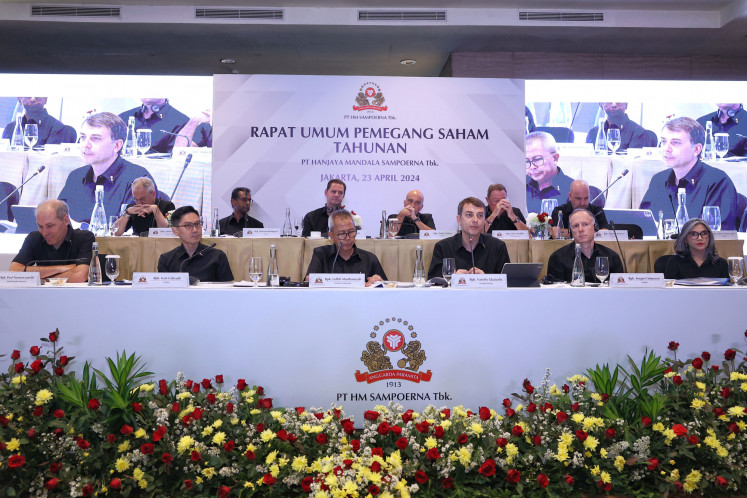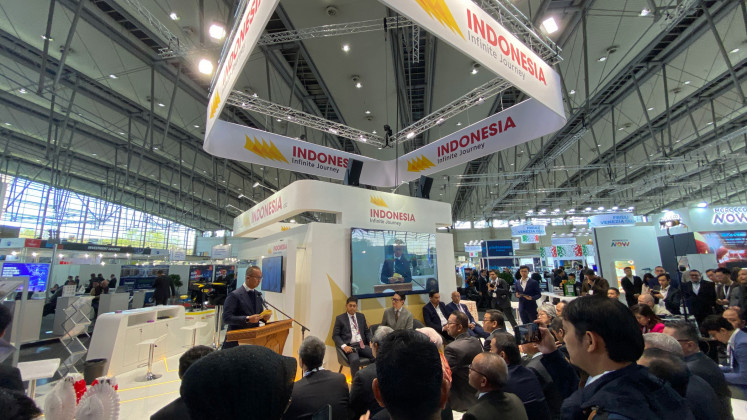Reducing net-zero emissions key to climate action
Change Size
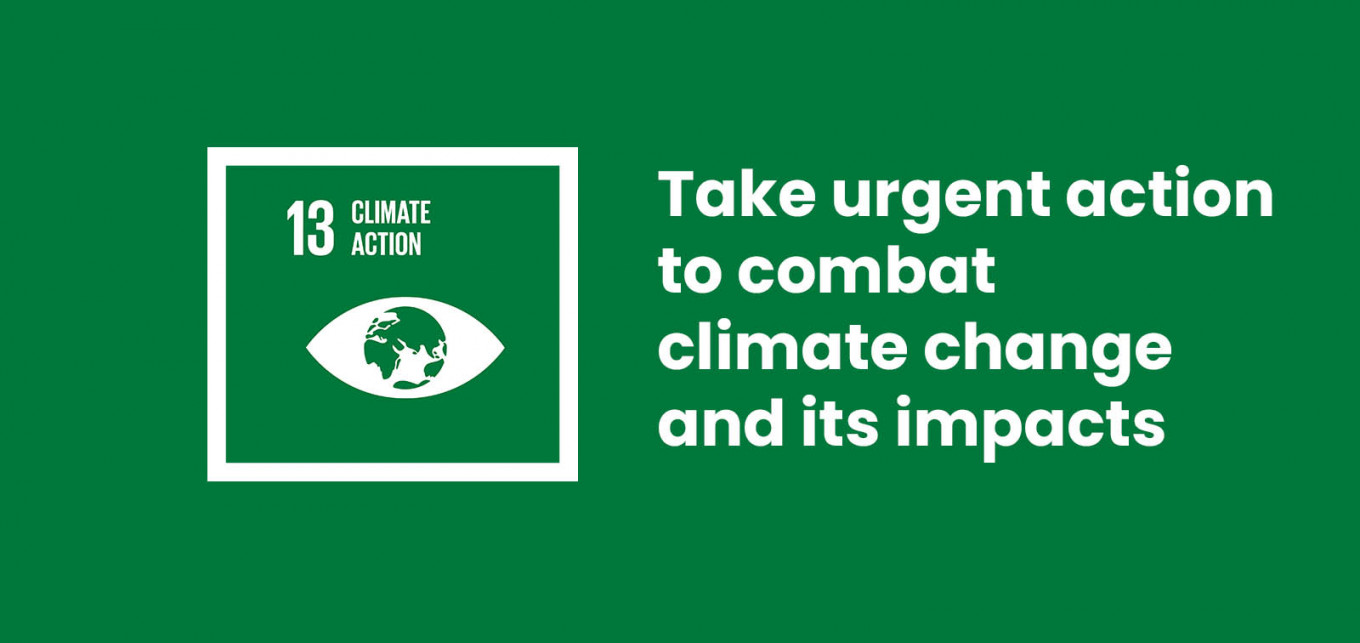
E
xacerbated by the COVID-19 pandemic, which revitalized concern for the natural world, the conversation on climate change is becoming increasingly serious, with governments and activists pushing for urgent action in combating what is seen as the most pressing matter of this era.
Greenhouse gas (GHG) emissions are one of the largest contributors to climate change, and a drastic reduction in GHG emissions is needed to avoid the worst impacts of climate change. In this regard, net-zero carbon emission is the gold standard for global emission targets.
Net-zero emissions refers to achieving a balance between greenhouse gas emissions produced and taken out of the atmosphere. What this means is that while we still produce emissions, the same amount must be taken out, which can be done by reducing current emission output and/or creating other ways to reduce past emissions.
While the pandemic did reduce emissions as lockdowns stopped many people from commuting and factories from operating, stopping climate change will take more than a temporary halt in the global economy.
A report by the United Nations Environment Programme (UNEP) warned that the world is on track to warm more than 3 degrees Celsius this century. It found that GHG emissions have grown an average of 1.4 percent per year since 2010, and anticipates 2020 emissions to drop by 7 percent from levels recorded in 2019 due to COVID-19. However, the dip will slow global warming by only .01 degrees by 2050.
To rectify this, the report suggests solutions such as direct support for zero-emissions technologies and infrastructure, as well as reducing fossil fuel subsidies, among other steps. Though seemingly drastic for some, these measures can reduce 2030 emissions by up to 25 percent from pre-COVID-19 predictions, significantly increasing the possibility of limiting warming to below 2 degrees above preindustrial levels.
As G20 countries make up 75 percent of total global emissions, Indonesia has, of course, mapped its own action plan. National Development Planning Minister Suharso Monoarfa went on record at the 2021 Indonesia Net Zero Summit to say that 99 percent of disasters in 2020 were categorized as hydrometeorological disasters, showing the significance of climate change.
Suharso, who also serves as the chairman of the National Development Planning Agency (Bappenas), explained that Indonesia was committed to the 2030 Sustainable Development Goals, in which low carbon development and climate endurance are some of the top government priorities. Bappenas has prepared four scenarios of when Indonesia would reach net-zero, namely, 2045, 2050, 2060 and 2070. The earlier the deadline is, the more robust Indonesia’s efforts should be to reduce emissions. But a more ambitious target would result in larger economic benefits for Indonesia.
“Our scenarios illustrate that a green economy and low carbon development can spur sustainable economic growth in the future and help the country escape the middle-income trap by 2045,” Suharso told a virtual summit held by the Foreign Policy Community of Indonesia (FPCI) on Tuesday.
To achieve net-zero emissions, he continued, Indonesia would have to adopt policies that would drive energy efficiency rates to around 6 percent, up from the current state of only 1 percent.
In addition, the Environment and Forestry Ministry is currently working on a ministerial regulation on Carbon Economic Value (NEK), which is expected to act as a legal umbrella for low carbon development to meet the 29 percent GHG emission reduction target by 2030.
The presidential regulation will cover a number of NEK-related aspects, including carbon offset and trade, result-based payments and carbon taxes, along with supervisory and control measures and certification. If approved, the ministry will be able to design a road map for a long-term carbon economy.
Private sector’s contribution
While government action is, of course, paramount, the private sector is also important in achieving net-zero emissions targets. Major companies around the world have pledged net-zero emission commitments, including British Petroleum, Ford Motor Company, Foxconn and American Airlines.
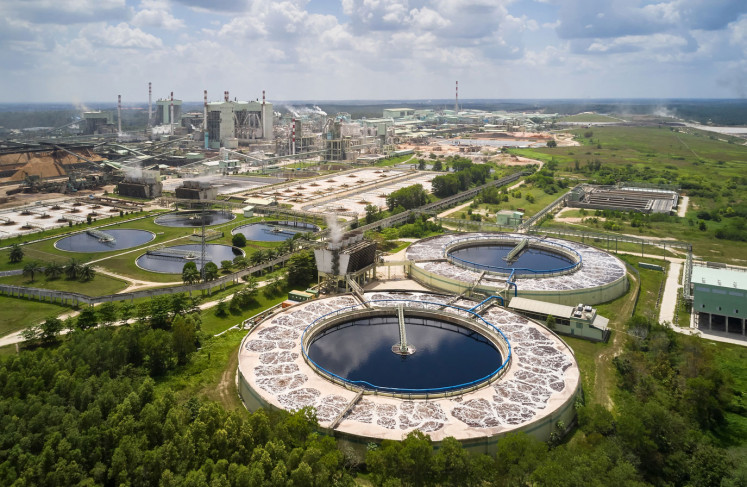
As for Indonesia, Riau-based sustainable pulp and paper producer Asia Pacific Resources International (APRIL) recently launched its APRIL2030 commitment, which covers several action plans to tackle climate and environment issues, along with its plan to become a sustainable company in the next decade.
One of the focuses is to implement Climate Positive, with the main target being to reach net-zero emissions from land use by 2030. Besides Climate Positive, APRIL2030 consists of three other pillars as a main commitment, which are Thriving Landscape, Inclusive Progress and Sustainable Growth.
“Why did we launch this commitment in the middle of a pandemic? It’s because behind a tough and challenging situation, we have a chance to transform for a better future,” RGE managing director Anderson Tanoto said in a virtual meeting.
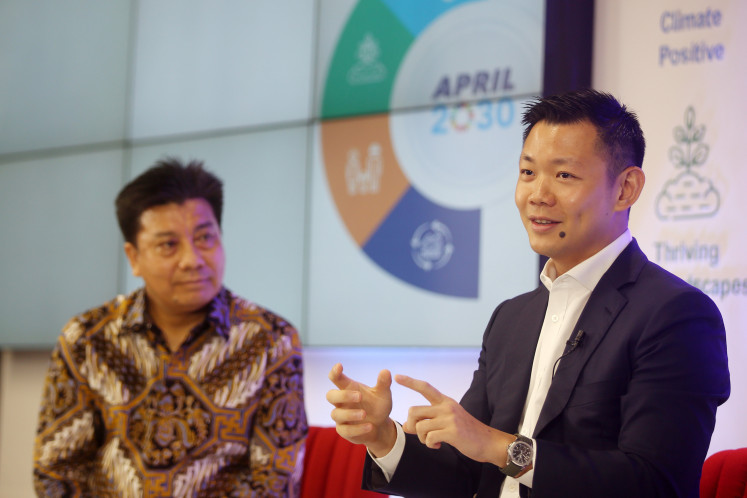
For reaching the target in Climate Positive, APRIL Group aims to realize net-zero emissions by optimizing carbon absorption and storage through its land use, along with minimizing emissions through landscape management.
The PaperOne-branded paper producer is committed to creating renewable and eco-friendly energy for 90 percent of its factory energy needs and 50 percent of its operational energy needs. Measures include the installation of solar panels with a capacity of 20 megawatts, considered to be the largest installation in Indonesia from the private sector when it is expected to finish in 2025.
The move is in line with government priority targets to increase the portion of renewable energy to 23 percent in 2025 and 31 percent in 2050. It also supports the Paris Agreement in reducing the global temperature increase to under 2 degrees by reducing carbon dioxide emissions.
APRIL Group is also committed to extending current conservation and restoration measures until 2030. In Thriving Landscape, the company will expand conservation and restoration areas outside of operational regions by earmarking funds from every ton of wood used in its production. It plans to invest in the environment by up to US$10 million each year.
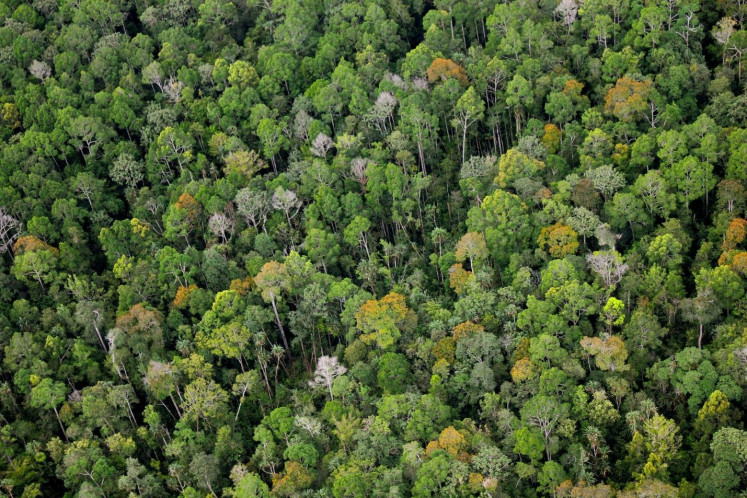
On the issue of tropical peatlands, APRIL Group is currently finishing the Eco Research Camp in Kampar Peninsula, Riau. The research center will welcome scientists, academics, as well as stakeholders who wish to conduct research on peatland.
Prior to the APRIL2030 commitment, the company had held numerous discussions with the relevant institutions and ministries, like the Office of the Coordinating Economic Minister and the Environment and Forestry Ministry.
As it stands, achieving climate standards is not the duty of one party, but rather a collaboration of everyone involved in realizing prosperity for the human race, and to safeguard our planet for generations to come.





